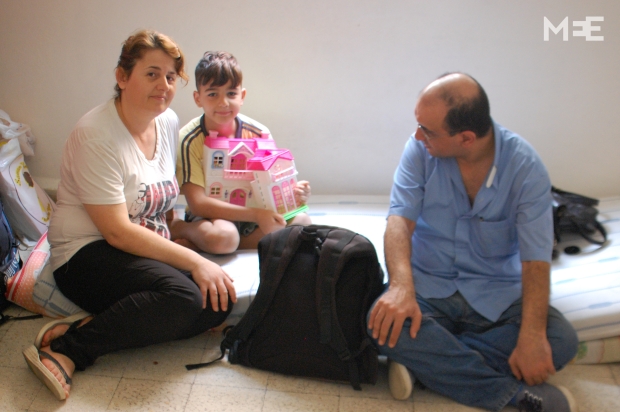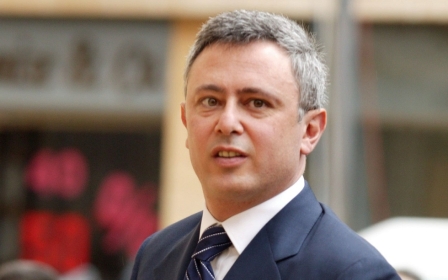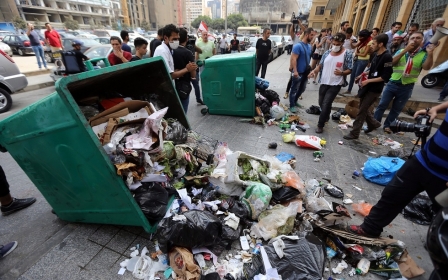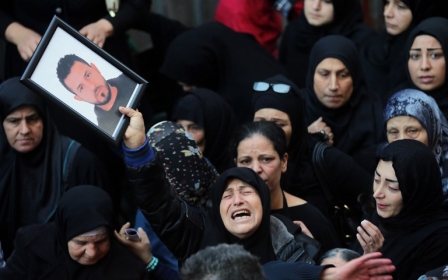Beirut’s forgotten Christian refugees
In the narrow streets of Sed el Baouchrieh, a northern neighbourhood of Beirut, a large apartment houses Hana and her two adult daughters, who are in their early twenties.
This Iraqi family arrived in Lebanon in mid-August after a year and a half in Turkey. They originally fled from Teleskof in Iraq with their father, an alcoholic who was beating his wife, and who eventually decided to leave Turkey to go back to Iraq without his family.
“I’m lucky my two girls found jobs and help me with the rent, as does my nephew, but it’s not enough anymore,” Hana told Middle East Eye.
Hana could not envision going back with her husband and couldn't see any option other than to leave Turkey and go to Lebanon to try and restart her life. The struggle just to survive there has been a shock to her.
With the $500 per month rent proving too expensive, she had to move to a cheaper place, helped temporarily with donations of money and furniture by Notre Dame de la Miséricorde centre, a religious charity helping mostly Chaldean Iraqis.
Last year, with the Islamic State conquering vast swathes of Iraq, many Iraqi Christians were forced to flee their homeland and seek refuge in neighbouring countries. The UNHCR estimates that around 84 percent of the registered non-Syrian refugee population in Lebanon are Iraqis.
Although Iraqi refugees have had an increased presence in Lebanon since 2003, their number increased significantly between July 2014 and February 2015 due to the deteriorating security situation in Iraq. Among those fleeing were a significant number of Iraqi Christians who sought shelter and help in Beirut.
In Notre Dame de la Misericorde Center, located in the poverty-stricken northern suburbs of Beirut, between 20 and 30 Iraqi families are registered every month to receive food supplies and other kinds of aid.
“Iraqis have been here since the 90s, but the last year has been very hard, especially for the Christians because of the persecutions led by the Islamic State on the ground,” Georges Khoury, director of the centre, told MEE. Here they mostly help Chaldean Christians, thanks to an agreement between the Lebanese Chaldean Church and the headquarters of the Iraqi Patriarchate.
“The Chaldean population in Iraq have been violently attacked by Islamic militias, and they arrive in Lebanon constantly,” he added. “At least 20 to 30 families have come to register in the centre each month for over a year and, with barely enough to pay for a plane ticket to Lebanon, they are left penniless and near destitute.
As a result, the Chaldean Bishopric decided to open an office in order to welcome them properly when they come to register in Sed el Bauchrieh, where most of them go to find shelter, since the area is very poor and the rents are affordable.” Khoury said the centre is helping 3,000 families, some 15,000 people, out of the 50,000 Iraqis he estimates are present in Lebanon.
Limited means for needy refugees
At Notre Dame de la Misericorde, two social workers and five volunteers help the refugees as best they can, providing healthcare through a medico-social centre with the organisation Caritas.
They help by providing clothes and food, as well as financial and furniture donations after regular visits to their beneficiaries. These activities depend mostly on donations from the Chaldean diaspora and Catholic churches in Europe, Australia, Canada and the US.
“Christian Iraqis think they are coming to a country that can ensure them a refuge, but in Lebanon you have plenty of problems - besides the international community turned their back on them,” said Khoury.
“Their problem is as important as the Syrians’, but they are less numerous, although they have suffered violence in their own country for the past 25 years. Here they can’t find a job because of the high Syrian competition, and the means of the Lebanese community is very limited.”
In 2015, UNHCR released around $US 3.7mn for non-Syrian refugees in Lebanon. This aid goes towards offering protection, legal aid, food coupons with the World Food Programme, temporary emergency or specific needs cash assistance, monthly unconditional cash assistance, education, healthcare and resettlement in another country.
This year, 1,300 of the non-Syrian refugees were resettled through this procedure. But Khoury insists it is not enough: “Only 20 percent of international help goes to Iraqis in Lebanon, everyone focuses on Syria.”
Janane Mater, director of the Christian organisation Triumphant Mercy, founded after the 2006 war with Israel, confronted this issue head on: “In June 2014, we saw a number of Iraqis, mostly Christians, arriving in Beirut. At first, it was hard to include them in our projects because all the funding we were receiving was for Syrians. With Dorcas - another Christian NGO we collaborate with - we launched an internal policy to include them. It is our duty to help our martyred brothers. Plus we are not directly connected to the UNHCR so we can decide whom to help and how. We can help Lebanese, Syrian and Iraqi people according to their needs and not because of politics.”
Triumphant Mercy receives people directed to them by the Assyrian Archbishopric in Bourj Hammoud, close to the Sed el Bauchrieh area, and from other churches.
Until April 2015, 1,865 families sought the charity’s help and in the last six months the organisation has helped a further 600 families. “We receive donations from the Bible Society, as well as Christian Lebanese associations, from the diaspora and mostly from churches,” Janane Matar told MEE.
“Even if we focus on Christian Iraqis now, we don’t forget the poor Lebanese people we were helping before. We always include them in our projects and programmes in balance with the number of concerned Iraqis.” In her opinion, Iraqis are not forgotten from the international community’s aid system, even though they are not directly targeted: “On a practical aspect, we can actually include them.”
Families living in poor conditions
In order to verify the information given by families to Notre Dame de la Misericorde Centre, as well as checking if the beneficiaries need something specific, volunteers often visit them in their homes. Raphael Koupaly-Bidawid, a Lebanese volunteer, makes daily tours in Sed el Bauchrieh. “We have a file with their identity, the list of donations they’ve received and what they still need,” he explained. “I just have to talk to them, check if the information is accurate, and see what we can do.”
One of his cases is Satiha and her three children - Ranine, 21 years-old, Hans, 16, and Mazen, five - who live in a small apartment, which is without water or electricity most of the time. Electricity cuts out for three to nine hours a day in the neighbourhoods of Beirut, and the water tanks are barely full when a new family moves in, leading to frequent shortages especially during summer time.
"My husband is still in Iraq to help his sick mother,” Satiha told MEE. “Hans is looking for a job, and Ranine as well.”
Ranine, her eldest, studied medicine for six years and was an intern in a hospital in Mosul. As a refugee, she is not able to find work despite her medical qualifications: “I would like to find a job in a hospital here. I want to become a pediatrician, but it’s not possible, my degree is not valid in Lebanon.”
They arrived two months ago from Mosul, and immediately presented their file to the UNHCR to get assistance. Their second interview is in December, but they have only got a one-month visa dating from when they first arrived in Lebanon.
“If they want to stay longer, they will have to pay a fine,” Koupaly-Bidawid explained. “But if they want to renew, the general security will refuse. If the United Nations decides to send them to [another] country, the person who stays will have to pay 200 dollars per month. But if they go back to Iraq, they risk a five-year ban of entry into Lebanese territory.”
Lebanon, first choice for Christian Iraqi refugees
Like many others, these two families arrived in Beirut because they knew someone who had already found shelter here. But they came because they also consider it a safe place for Christians in the region.
“A lot of Christians in Iraq went to Iraqi Kurdistan, but Lebanon has always been seen by them as the only democratic country where all religions are respected,” stated Khoury. “But Lebanon is only a step before emigrating to Canada, the US or Australia if they can. They don’t feel comfortable here surrounded by Muslim Syrian refugees. They suffer as much as the Christian Syrians, but the latter are more connected with Lebanon, they often have family here.”
According to Janane Matar, Lebanon is also a logical choice for Christian Iraqi refugees: “In Lebanon, you don’t need a visa before landing, and you have easy access to all the embassies you are interested in, as well as the United Nations offices. They don’t like to go to Turkey because of the dominant Muslim presence.
"They have been traumatised by Muslim attacks and need a Christian presence that they can find in Lebanon. A lot of Syrians want to go home, whereas these Iraqi Christians are looking for a permanent place to live. They want to go abroad because it is very difficult here. Lebanese people are fed up with refugees and they feel it.”
New MEE newsletter: Jerusalem Dispatch
Sign up to get the latest insights and analysis on Israel-Palestine, alongside Turkey Unpacked and other MEE newsletters
Middle East Eye delivers independent and unrivalled coverage and analysis of the Middle East, North Africa and beyond. To learn more about republishing this content and the associated fees, please fill out this form. More about MEE can be found here.





